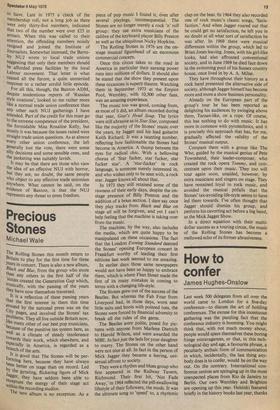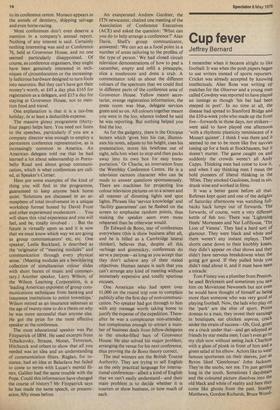How to confer
James Hughes-Onslow
Last week 500 delegates from all over the world came to London for a five-day conference—to discuss the art of holding conferences. The excuse for this incestuous gathering was the puzzling fact that the conference industry is booming. You might think that, with not much money about, people would spare themselves these boring fringe extravagances, or that, in this technological day and age, a favourite phrase, a peculiarly archaic form of communication in which, incidentally, the last thing anybody does is to confer, would be on the way out. On the contrary. International conference centres are springing up in the most unexpected places from Rio de Janeiro to Berlin. Our own Wembley and Brighton are opening up this year. Helsinki featured briefly in the history books last year, thanks to its conference centre. Monaco appears in the annals of dentistry, shipping salvage and even horse-racing.
Most conferences don't even deserve a mention in a company's annual report. Nothing of any interest is said. Certainly nothing interesting was said at Conference 76, held at Grosvenor House, and no one seemed particularly disappointed. Of course, as conference organisers, they might have been genuinely interested in techniques of circumlocution or the increasingly ludicrous hardware designed to turn fools into neurotics. But they can't have got their money's worth, at £45 a day plus £165 for registration as a delegate, and £15 a day for staying at Grosvenor House, not to mention food and travel.
One explanation is that it is a tax-free holiday, Or at least a deductible expense.
The massive glossy programme (thirtyfour pages) helps here. You need not listen to the speeches, particularly if you are a company director wise enough to employ a permanent conference representative, as is increasingly common in America. An American delegate told me that he had learned a lot about salesmanship in Portobello Road and about group communication, which is what conferences are called, at Speaker's Corner.
Here are some examples of the kind of thing you will find in the programme, guaranteed to keep anyone back home quiet. 'Solutions are discussed in an atmosphere of total involvement in a unique workshop format hosted by David Frost and other experienced moderators. . . You will share this vital experience and you will feel, and be, totally involved . . . But the future is virtually upon us and it is now that we must know which way we are going as group communicators' etc, etc. One speaker, Leslie Buckland, is described as the 'originator of "meeting modules" and communication through every physical sense.' (Meeting modules are a bewildering collection of simultaneous colour slides with short bursts of music and commentary.) Another speaker, Larry Wilson, of the Wilson Learning Corporation, is a 'leading American exponent of group communications techniques from banking and insurance institutions to entire townships.' Wilson retired as an insurance salesman at the age of twenty-nine to do a thesis on why he was more successful than anyone else. He got the prize for the most effective speaker at the conference.
The most educational speaker was Pat Fitzpatrick of IBM. He used excerpts from Tchaikovsky, Strauss, Monet, Tennyson, Hitchcock and others to show that all you needed was an idea and an understanding of communication filters. Raglan, for instance, had an idea at Balaclava but failed to come to terms with Lucan's mental filters. Galileo had the same trouble with the Pope. Could this information have changed the course of history ? Mr Fitzpatrick says he has made the same speech, or presentation, fifty times before. An exasperated Andrew Gardner, the ITN newscaster, chaired one meeting of the Association of Conference Executives (ACE) and asked the question: `What can you do to help arrange a conference?' Alan Davis, Shell's group communicator, answered: 'We can act as a focal point in a number of areas tailoring to the profiles of the type of person.' We had closed circuit television demonstrations of how to peel a cucumber, empty and refill a pineapple, slice a mushroom and dress a crab. A commentator told us about the different colours of the spectrum that we could find in different parts of the conference area of Grosvenor House. Yellow meant secretariat, orange registration information, the press room was blue, delegate services green and so on. All colours together meant you were in the loo, whence indeed he said he was reporting. But nothing helped you find the loo.
As for the gadgetry, there is the Octopus lectern which 'gives him his cue, illuminates his notes, adjusts to his height, cues his presentation, stores his briefcase out of sight, tells him when to stop and then packs away into its own box for easy transportation.' Or Charlie, an innovation from the Wembley Conference Centre. He is a television cartoon character who can be made to answer questions spontaneously. There are machines for projecting live colour television pictures on to a screen and all manner of dimming lights and spot lights. Phrases like `service knowledge' and 'facility guarantees' can be flashed on the screen to emphasise random points, thus making the speaker seem even more rehparsed than he otherwise would.
Dr Edward de Bono, star of conferences everywhere (this is show business after all, and he is billed as a Cambridge lateral thinker), believes that, despite all this verbiage and gimmickry, conferences do serve a purpose—as long as you accept that they don't achieve any of their stated objectives. Human nature is such that you can't arrange any kind of meeting without immensely expensive and totally spurious excuses.
One American who had spent over S1,000 on the round trip rose to complain publicly after the first day of non-communication. No speaker had got through to him with any message worth taking home to justify the expense of the expedition. Thereafter he was a conspicuous non-attender, but conspicuous enough to attract a number of business deals from fellow-delegates in the smoke-filled bars of Grosvenor House. He also solved his major problem, arranging the venue for his next conference, thus proving the de Bono theory correct.
The real winners are the British Tourist Authority. They are trying to sell English as the only practical language for international conferences—albeit a kind of English that we can't easily understand—and their main problem is to decide whether it is tourism or show business, or how much of each.



































 Previous page
Previous page